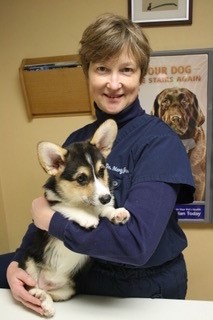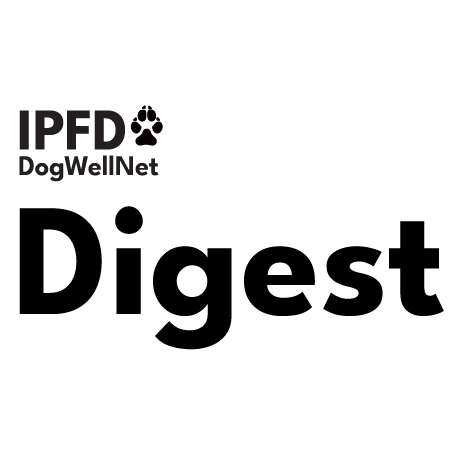News & Highlights
-
Just Confirmed:
5th IPFD International Dog Health Workshop!
We are excited to announce that the 5th IPFD International Dog Health Workshop (IDHW) will be co-hosted by Suomen Kennelliitto (Finnish Kennel Club) in June 2024.
Stay tuned for more details!
- We're excited to introduce the new Health Strategies Database for Dogs (HSDD), a searchable database that includes breed-specific health/mentality testing requirements and recommendations established by Health Strategy Providers (HSPs) including kennel clubs, breed clubs, veterinary organizations, and others. Learn more in the Spotlight feature below.

-
Please join us in congratulating IPFD Board Member Dr. Marty Greer, recipient of the 2023 Veterinarian of the Year Award, presented by the Westminster Kennel Club in partnership with Trupanion. Thank you, Marty, for all you do for IPFD and the global dog community! Press Release
-
IPFD CEO Marc Ralsky and his now-retired champion Samoyed, Striker, were recently profiled in an article in the New York Times.
Breeds Resources
Breeds of the Month
★ This Month We Feature TWO Breeds: The Dobermann and the Shih Tzu ★ 
Dobermann
Brief Description: The Dobermann is the only German breed which bears the name of its original breeder, Friedrich Louis Dobermann (02.01.1834 – 09.06.1894). He was believed to be a tax collector, offal abbatoir manager (knacker) and a part time dog catcher, legally able to catch all stray dogs. He bred with animals from this reservoir that were particularly sharp. The so called “butcher’s dogs” which were already considered a relatively pure breed at that time, played a most important role in the origination of the Dobermann breed. Source: FCI
NEW: Get a GRIHP on the Dobermann is part of a series to highlight the Big Picture of health, welfare, and breeding and to help develop Globally Relevant Integrated Health Profiles (GRIHPs) for many breeds.
Learn more about the Dobermann in our Pedigree Breeds Database.
Shih Tzu
Brief Description: The roots of the Shih Tzu are in Tibet but it was developed in China, where dogs like these lived in the imperial palaces. After China became a republic in 1912, examples of the breed found their way to the West. Temperamentally, the Shih Tzu is a bouncy character and very outgoing. A complete extrovert and full of infectious enthusiasm, he makes a delightful companion who is happy to be part of any family. Source: The Kennel Club
NEW: Get a GRIHP on the Shih Tzu.
Learn more about the Shih Tzu in our Pedigree Breeds Database.
IPFD Partners in Action
- IPFD Collaborating Partner, The World Small Animal Veterinary Association (WSAVA), has recently published the latest edition of Dog Breeds: What You Need to Know, a regular feature in their online news section (and in the WSAVA Bulletin) that highlights IPFD resources on a particular breed with a focus on breed-specific diseases.
 In recent editions: Meet the Dobermann – Update Your Knowledge! and Meet the Shih Tzu – Update Your Knowledge!. You can also view previous editions of Dog Breeds: What You Need to Know in our archive article here on DogWellNet.com.
In recent editions: Meet the Dobermann – Update Your Knowledge! and Meet the Shih Tzu – Update Your Knowledge!. You can also view previous editions of Dog Breeds: What You Need to Know in our archive article here on DogWellNet.com.
Blogs
-
In her post, What does IPFD offer to its kennel club Partners?, our Business and Project Coordinator, Katariina Mäki, provides an overview of the tools, resources, and other benefits IPFD offers our current kennel club colleagues and what we can do for others who wish to join us.
- In our New Research Blog, IPFD's Ann Milligan offers a look at a report describing initiatives to prevent inherited diseases and extreme phenotypes in dogs: Mapping of initiatives to prevent inherited diseases and exaggerated phenotypes in dogs.
Harmonization of Genetic Testing for Dogs (HGTD)
-
Genetic Test Providers: Join Our Global Community!
We believe the canine genetic testing sector becomes stronger as a whole when its leaders work together to address common challenges in genetic testing and improve overall consumer confidence in their services. And, when more Genetic Test Providers (GTPs) participate in HGTD, the benefits extend not only to these GTPs, but also to the thousands of breeders, veterinarians, researchers, and owners who use this important resource each year.
 We've prepared a document outlining the benefits of participating in the HGTD, along with some key facts and figures from this unique initiative. Please feel free to contact me with any questions or to discuss your options for participating in the Harmonization of Genetic Testing for Dogs. Support HGTD.pdf
We've prepared a document outlining the benefits of participating in the HGTD, along with some key facts and figures from this unique initiative. Please feel free to contact me with any questions or to discuss your options for participating in the Harmonization of Genetic Testing for Dogs. Support HGTD.pdf
We also ask our kennel club partners to please share the above document with your preferred Genetic Test Providers, and that you also inform your members of the genetic testing resources available on DogWellNet.com.
- Our HGTD Project Manager, Aimee Llewellyn-Zaidi, provides answers to your questions on canine genetic testing in Ask Aimee. If you’d like to submit a question to Aimee, please email her at aimee.llewellyn-zaidi@ipfdogs.com.
Get Involved in HGTD!
We welcome additional participant GTPs, more collaborators from any stakeholders concerned with dog health and welfare, the advice of experts, the participation of breed clubs and other consumer groups. We stand ready to provide more information to ongoing discussions.
Please feel free to contact us as we work together for healthy dogs and to support those who breed and own them:
HGTD Project Manager, Aimee Llewellyn-Zaidi.
Introducing the
Health Strategies Database
for Dogs (HSDD)
IPFD's new Health Strategies Database for Dogs (HSDD) is a searchable database that includes breed-specific health/mentality testing requirements and recommendations established by Health Strategy Providers (HSPs), including kennel clubs, breed clubs, veterinary organizations, and others.
Use the HSDD to get a sense of the international ‘picture’ of work being done to identify health and temperament issues of concern for a given breed.
Breed-specific health testing strategies are created by the groups responsible for the sustainable health and welfare of a breed – generally kennel clubs and (national) breed clubs. These groups examine the evidence available on the occurrence, severity, commonness, heritability, and overall importance of various conditions known to occur within a breed. They then determine whether there are health tests available to characterize the sire and dam, and/or puppies, to provide information to direct breeding decisions by breeders.
Health Strategy Providers (HSPs) have different goals, different priorities, and different authority in terms of recommending or requiring health testing and may design different strategies. Some have long lists of conditions of interest, some shorter lists. This depends also on the breed.
- Those HSPs who control registration of dogs/puppies or who control membership to a group (e.g., OFA CHIC registration) may make some these health screening tests mandatory (required, R1 in HSDD breed charts) for e.g., hip dysplasia screening in many breeds.
- In other cases, health testing or other consideration of the condition may be ‘recommended (R2)’ or
- It may be that the condition is simply on the radar of breed representatives, and it is ‘recognized (R3) as a potential issue in the breed.
Health conditions included in the breed listings are those covered in the Nordic countries’ RAS & JTO documents, obtained via links to US breed clubs’ use of OFA CHIC testing information, concerns addressed in the UK’s Breed Conservation Plans, and from an array of impactful health & welfare tools, programs and initiatives.
There is a breed-specific component to the frequency of disorders in particular dog breeds or in ‘groups’ of dogs; for example large sized dogs, working breeds, herding breeds, short-muzzled or short-legged breeds’ groups can have similar health disorders or shared welfare management concerns.
Using a breed-specific approach to identify which health issues occur in a breed and how many dogs are impacted by a given condition(s) guides any breed manager’s focus and efforts to address and improve the situation for individual dogs and the breeds at a population level.
Note: Conditions are listed as general categories (to provide a manageable presentation); details of specific conditions are contained within the breed-specific data provided by HSPs. More information is available by following URLs to the HSP.
Special thanks to Jenni Uski and Brenda Bonnett for their efforts in making the HSDD a reality!
Make a Donation
IPFD is truly a "people driven" service organization. We allocate the bulk of our financial resources to maintain a small but dedicated team of consultants to manage our modest resources and facilitate the activities of our stakeholders, with the aim of achieving our collective goals.
You can specify how your donation is used (support IPFD and its programs and activities OR support the Harmonization of Genetic Testing for Dogs). All donations are handled securely via PayPal.
Select one of the options below to make a donation now.
Stay Informed
Members can opt to receive notifications by email. Are you on our email list? Click here to edit your Notification Settings (you must be logged in to your account).
Viewing as a Guest? Sign in or register now to get the most out of DogWellNet.com.
Click an icon below to visit our social media sites:


.png.1142834a11bd21106b8daa3917eafcd0.png/a35c442678445896b5c8f85cbe82feffca6e0c39.png?v=3ccd354030)











Recommended Comments
Join the conversation
You can post now and register later. If you have an account, sign in now to post with your account.
Note: Your post will require moderator approval before it will be visible.